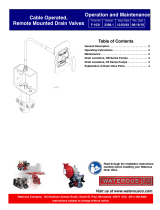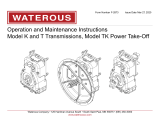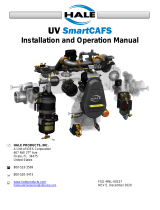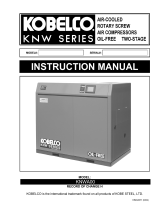Page is loading ...

Installation Instructions
TC20 EclipseTM ES CAFSystem Form No.
T-363
Issue Date
07/23/09
Rev. Date
07/19/12
Waterous Company 125 Hardman Avenue South, South St. Paul, Minnesota 55075 USA (651) 450-5000
Instructions subject to change without notice.
Safety Information 2.................................
Introduction 2......................................
Components 3, 4....................................
Installation:
Mountings (Reference DPL83001 for Dimensions:
Clearances Required for Maintenance 5..............
Driven Shaft Angle/Length 5........................
Compressor: 6....................................
General Guidelines 6............................
Dimensions of Components 7.....................
Oil and Water Line Schematic 8...................
Air Filter 9......................................
Oil Sump and Oil Temperature Sensor 10...........
Air/Oil Separator 11..............................
Oil Cooler 12...................................
Wye Strainer for Oil Cooler Water Line 13..........
Compressor Panel Components:
Electric Auto-Sync Panel 14.........................
Oil Temperature Gauge 14..........................
Master Air Pressure Gauge 14.......................
Panel Plates 14...................................
Compressor Air Connections:
Air Line Schematic 15..............................
Air Filter 15.......................................
Master Air Pressure Gauge 15.......................
Air Clutch Connection 16...........................
Air Distribution Ports 17.............................
Water Drains:
Oil Cooler 18......................................
Foam System 18..................................
Table of Contents
Lubrication:
Pump Transmission 19.............................
Air Compressor 19.................................
Electrical Wiring:
Compressor:
Wiring Schematic 20...............................
Power to Compressor Relay Panel 21................
Air Clutch Engage Switch 21........................
“Throttle Ready" Interlock Loop 22...................
Electric Auto-Sync Panel:
Wiring to Relay Panel 23.........................
Schematic 24...................................
Air Clutch Solenoids 25.............................
Air Discharge Solenoids 26.........................
Compressor Overheat Light and Alarm 27.............
Compressor Oil Temperature Gauge 27..............
Oil Temperature Sensor 28.........................
Suggested Third Party Components
Air Flow Meter 29....................................
Master Air Pressure Gauge 29.........................
Air Lines Between Components 29.....................
Hydraulic Lines Between Components 29...............
CAFS Discharge Components 29, 30...................
Initial Power-Up 31..................................
Calibration:
Control Air Circuit Schematic 32........................
Electric Auto-Sync System 33..........................
Control Air Circuit Calibration 33.......................
Control Air Circuit Component Locations 34..............
Troubleshooting Guide 35-37........................

T-363 Page 2 of 37
Safety Information
Read through and communicate safety information to the
end user of this Waterous Component.
WARNING
!
Death or serious personal injury might occur if proper operating procedures
are not followed. The pump operator, as well as individuals connecting
supply or discharge hoses to the apparatus must be familiar with these
pump operating instructions as well as other operating instructions and
manuals for the apparatus, water hydraulics and component limitation.
WARNING
!
Pressure Hazard. May result in personal injury.
Prior to connection or removal of hoses, caps or other closures with pump
intake or pump discharge connections, relieve pressure by opening drains
or bleeder valves. Bleeder valves should also be used while filling a hose
connected to an intake with water.
WARNING
!
Scalding Water Hazard. May result in serious burns.
When operating the pump, be sure to open at least one discharge valve
slightly to prevent the pump from overheating. If the pump runs for a few
minutes completely closed, it may heat the water enough to scald someone
when the valve is opened. Overheating can damage the packing, seals
and other pump parts. If the apparatus builder has installed a by-pass sys
tem or other provision designed to prevent overheating, opening a dis
charge valve may be unnecessary.
WARNING
!
Compressed Air Pressure Hazard. May result in personal injury.
Compressed air can be dangerous. Make sure the pressure is allowed to
bleed down to atmospheric pressure prior to opening any connections or
valves.
Introduction
This instruction covers the installation of a Waterous TC20 Eclipset ES CAF
System. The Eclipse ES consists of a TC20 power take-off and an oil-flooded
rotary screw compressor capable of 200 CFM (5.6m3/min).
Figure 1. TC20 Eclipset ES
The following installation instructions are available:
·TC20 Power Take-Off, T-362
·Priming Systems, F-1031, Section 3023
Before proceeding with the installation of the Eclipset ES, read the following
instructions carefully. Check the appropriate dimensional drawings in the Engi
neering Manual as needed.
CAUTION
Operating Speed Limit.
May cause damage to the pump and/or air compressor.
The Eclipse compressor has a maximum operating speed of 8950 RPM.
Do not allow the compressor to run beyond 8950 RPM.
Compressor speed can be calculated by (Engine Speed) x (Pump Trans
mission Ratio) x 2.5.

T-363 Page 3 of 37
Com
p
onents
Standard Items Furnished
Items Not Furnished by Waterous
Installed On Compressor Shipped Loose
Ref.
No. Description Ref.
No. Description Item See
Page
2TC20 Power Take-Off
16 Air/Oil Separator Air Flow Meter (Use is Optional) 20
17 Oil Cooler Air Distribution Valves 26
3Pneumatic Clutch 18 Air Filter and Elbow Air Line from Vehicle Air to Air Clutch
Solenoid 16
4PolyChain Belt 19 Compressor Oil Sump Air Lines Between Components 15
5Belt Adjustment Hardware 19A Safety Relief Valve Switch to Engage Air Clutch 25
6Air Inlet Valve 20 Oil Temperature Gauge Master Air Pressure Gauge 15
7Auto Balancing Valve 21 Oil Temperature Sensor Hydraulic Hoses Between Components 8
8Air Clutch Solenoid 22 Oil Cooler Water Strainer and Flush
Valve Compressor Overheat Light and Alarm 27
9Air Compressor 23 Electric Auto-Sync Control Panel Wiring from Vehicle to Compressor 21
10 Electrical Relay Panel 24 Air System Operation Panel Plate Wiring to “Throttle Ready" Light 22
12 Air Inlet Trim Valve (AITV) 26 Clutch Air Regulator Drain Line from Oil Cooler 18
13 Transmission Oil Fill Foam System 18
14 Transmission Oil Level Sight Glass
15 #4 JIC Connection for Oil Scavenger Line
26 Clutch Air Regulator
See Diagram on Next Page

T-363 Page 4 of 37
8
3
5
13
14
2
15
9
(Behind Panel)
7
10 (Mounted
on
Side)
11
6
12
4
Two Lifting
Eye Bolts
on Rear
One Lifting
Eye Bolt
on Front
NOTE: Unit shown with belt cover removed.
16
17
18 19
19A
20 21 22
23 24 25
Items Shipped LooseComponents (See Page 3 for Details)
26
13
IL3006

T-363 Page 5 of 37
Installation
Mounting
The figure below shows the maximum length and operating angle of a single
driven shaft.
Clearances - Compressor Air Clutch
Clearance required for clutch
cover and air clutch removal.

T-363 Page 6 of 37
Compressor
General Guidelines
CAUTION
Do not damage the vehicle chassis (also called frame or undercarriage)
during installation. Check with the vehicle manufacturer to make sure the
planned weld and bolts are in acceptable areas.
·Components must be bolted to brackets welded to the pump compartment
frame or bolted directly to the pump compartment frame.
·Allow enough clearance for routine maintenance, including clearance for
checking oil, adding oil, adjusting pressure, changing filters, cleaning screens
or opening drain valves.
·The sump (oil/air reservoir) can be mounted at the same level as the com
pressor or below it. If the sump must be mounted above the compressor (12
inches maximum), contact Waterous for the correct check valve to prevent
compressor flooding.
·The sump must be horizontal, level and in the proper orientation. Do not relo
cate or extend the sight glass.
·The oil sight glass must be visible after all the components are installed so
oil level can be monitored easily.
·The heat exchanger must be installed horizontally with the drain at the lowest
point.
·To prevent damage to hydraulic and air lines or accidentally disconnecting
them, run them along the support beams of the pump compartment whenever
possible, bundled with cable ties or other fasteners.
·Wire, hoses or tubing that passes through metal, such as a compartment pan
el, must have a protective bushing or shield around the edge of the hole to
protect against abrasion.
·To make troubleshooting easier, use colored air hoses as supplied and
shown on the air schematic (see Page 32 for color coding - Do not paint air
hoses).
·Labeling the lines is strongly recommended.
Compressor Component Dimensions - Oil Sump

T-363 Page 7 of 37
Compressor - Dimensions of Components

T-363 Page 8 of 37
Compressor - Oil and Water Line Schematic

T-363 Page 9 of 37
Air Filter
The air inlet on the air compressor can be turned in 90_ increments because
the bolt pattern is symmetrical. This simplifies installation of the air filter. If you
turn the inlet, you will need longer tubing. Either acquire colored tubing locally
or contact Waterous for the correct lengths and colors.
To change the rotation of the air inlet, disconnect the tubing, unbolt the inlet,
rotate the inlet and install the new tubing.
Mount the air filter, considering the following factors:
·Air intake area must be unobstructed.
·Air intake tubing should be as short and straight as possible. If length exceeds
12 feet, consult the factory.
·Maintenance clearance must be adequate for removing and replacing the fil
ter.
·The filter should be in an area that is unlikely to get wet.
The air inlet tubing (not included) from the filter to the air inlet is usually made
of thin-wall metal tubing (3 in. I.D.) and rubber elbows. Plumb it as though it
were an engine air inlet. Do not use flexible exhaust tubing or any material that
water or dirt can easily penetrate (see Page 7 for dimensions of filter and el
bow).
Air Filter Installation onto Compressor
Air Inlet

T-363 Page 10 of 37
Oil Sump and Oil Temperature Sensor
NOTE: Waterous will not be responsible for systems where the sump and sight glass
are installed such that the oil level cannot be checked or does not display the correct oil
level due to improper installation.
NOTE: The sump must be mounted vertically.
The sump works best when it is installed so that the sight glass opening is below the discharge
outlet of the air compressor, although mounting the sump at the same level as the compressor is
acceptable. In some cases, finding room for the sump can be difficult. It is acceptable to mount
the oil sump up to 12 inches higher than the air compressor, however, this requires the installa
tion of a check valve to prevent oil from flooding the compressor. Contact Waterous if a check
valve is required.
The Safety Pressure Relief valve may be installed in either of the ports. The remaining ports
have no options.
Install the Temperature Sensor in the bottom tap of the sump next to the drain.
Vertical Sump - Top Fittings Vertical Sump - Lower Fittings
Temperature
Sensor
Vertical Sump - Rear View
Vertical Sump - Rear View

T-363 Page 11 of 37
Air / Oil Separator
The separator filter can be installed anywhere there is room to securely mount it
and run the hydraulic and air lines.
·Install filter vertically with the housing up and the filter element down.
·Make sure there is room to remove and replace the filter element and the oil
scavenger tube.
Separator / Filter Side View with Fittings
Separator / Filter and Bracket Detail
Oil Scavenger Line Connection to Compressor
Attach Oil
Scavenger
Line Here
IL3053
To Air Pressure Gauge and
Fixed Manual Regulator
Oil Scavenger
to Air Inlet Valve
(Behind Bracket)
Oil Scavenger
to Air Inlet Valve

T-363 Page 12 of 37
Oil Cooler
CAUTION
Do not install a shutoff valve in the oil cooler water supply. This will result in
system overheat and failure and voids the manufacturer's warranty.
The oil returning to the compressor is cooled by passing it through a water-
cooled heat exchanger, usually called the cooler.
Oil Inlet / Outlet Ports
Oil
Outlet
Oil
Inlet
Water Inlet / Outlet Ports and Drain
Water
Outlet
Water
Inlet
·The oil inlet and outlet may be reversed to make installation easier.
·The water inlet and outlet may be reversed to make installation easier.
·Install the cooler to allow for proper drainage to prevent freeze damage.
Freeze damage due to undrained cooler.
Also shows small diameter of water tubes.
·The cooler must be installed horizontally with the drain at the lowest point and
with a slight slope toward the water drain end.
·The drain hose should be 0.5" I.D. minimum to provide proper drainage.
·The outlet of the drain hose must be lower than the cooler's drain outlet. The
drain hose should be a continuous downward run (no goosenecks) to allow
proper drainage.
·The hydraulic oil filter is mounted on the oil cooler. Make sure there is enough
room for servicing the filter.
·To mount the cooler on the side of a compartment, unbolt the brackets from
the ends and reattach them so the cooler can be installed with the drain at the
lowest point.
Adjustable Mounting Brackets / Cooler Mounting
Cooler mounted on the side of a pump
compartment with the cooler body slop
ing toward the drain for better drainage.
Supplied by Waterous

T-363 Page 13 of 37
Wye-Strainer for Oil Cooler Water Line
A Wye-strainer is provided to strain water before it enters the cooler's water
inlet. The Wye-strainer requires regular inspection and should be in an easily
accessible location for inspection, removal and cleaning.
CAUTION
Waterous is not responsible for damage due to plugged strainers. If the
customer's water system contains excessive debris or the vehicle relies on
drafting for its water supply, it may be necessary to install a larger strainer.
Without good water flow through the heat exchanger, the compressor will
overheat. Compressor performance will be inadequate and it may fail com
pletely.
Omitting the Wye-strainer or removing the screen from the Wye does not
improve water flow. It will allow debris into the cooler, which can clog the
tine heat exchanger tubes and restrict water flow.
Connecting the Cooler Water Lines and Wye-strainer
The cooler water is supplied by diverting water through a fitting (OEM sup
plied) from the discharge side of the fire pump (see the Compressor - Oil &
Water Schematic, Page 8). The cooling water supply hose should be 1/2" I.D.
to supply the proper flow for cooling the system. The cooler discharge water
may be routed to the booster tank fill tower or returned to the inlet side of the
pump, as per the end user's preference.
Normally, cooling water is returned to the booster tank and a check valve is
installed in-line to prevent backflow from the tank through the cooler. During
drafting and hydrant-supplied operations, the booster tank may overflow be
cause of the cooler water return. If this is objectionable, route the return line to
the inlet side of the pump. In this case, it is not necessary to install an in-line
check valve, but it will be necessary for the pump operator to open the tank fill
valve during operation to prevent overheating the fire pump and compressor.
Wye-strainer Installed with Cleanout Valve and Drain Line
Wye-strainer with Ball Valve
from IL3008

See Page 23
See Page 23
Not Furnished by Waterous, see Page 15 for specifications.
Panel Plates
See Page 27 for Wiring
from DPL82231
from DPL82231
Electric Auto-Sync Panel Oil Temperature Gauge
Panel Plates
Master Air Pressure Gauge
T-363 Page 14 of 37
Compressor Panel Components

Air Line Schematic
Master Air Pressure Gauge
Air Filter
See Page 9 for installation
Master Air Pressure Gauge - Not Furnished by Waterous
1. The master air pressure gauge is to be mounted on the operator's
panel and be plumbed to the master air pressure tap located on the
Minimum Pressure Valve (mounted on Air/Oil Separator).
2. The gauge is not furnished by Waterous and must have a 0-200 psi
pressure range.
3. Air line not furnished by Waterous (see Page 29 for suggested hose
size).
T-363 Page 15 of 37
Compressor Air Connections

Air Clutch Connection
Do not block exhaust port in threaded stud.
1/4 in., 3-way Solenoid Valve,
See Page 25 for wiring and Page 21 for
switch required to activate solenoid.
Connect air lines from vehicle air system to
1/4 in. female NPT threads of air regulator.
Air line not furnished by Waterous.
T-363 Page 16 of 37

T-363 Page 17 of 37
Air Distribution Port
Build air distribution manifold off tap in the minimum pressure valve. The min
imum pressure valve is mounted on the air oil separator which is remotely
mounted. Note that air distribution components are not furnished by Waterous.
See Page 30 for recommended components.
Air Distribution Port

Refer to Foam System Installation Instructions for Foam System drains.
Oil Cooler
Foam System
Drain
Water
Outlet
Water
Inlet
Drain
·The drain hose should be 0.5" I.D. minimum to provide
proper drainage.
·The outlet of the drain hose must be lower than the cooler's
drain outlet and the drain hose should be a continuous
downward run (no goosenecks) to allow proper drainage.
T-363 Page 18 of 37
Water Drains

Air Compressor
Add any type of automatic transmission fluid (ATF) through the oil level/fill
hole or by removing the breather. Approximately 6 quarts is required to fill
the transmission when completely drained. Fill to the bottom of “Oil Level"
port threads.
There is a sight glass provided on the oil reservoir/sump tank. The oil level
should be approximately half-way up the window. Check the oil on level
ground prior to system start-up (system holds approximately 2 to 3 gallons of
oil).
If the system has recently been run, wait 10 minutes after shut-down for the
oil to stabilize before checking the oil level.
The compressor uses a common non-foaming hydraulic oil. This oil is classi
fied by an ISO standard as ISO 68 viscosity and is sold under various trade
names. Many are sold as an “anti-wear" hydraulic oil and are available from
auto parts or lubricating oil supplies.
Oil Fill
Sight
Glass
Drain
Compressor holds
approximately 2 to
3 gallons.
Line from Air
Compressor
ISO 68
Viscosity
Oil
Oil Level
Sight Glass
Oil Drain
Oil Level / Fill Hole
T-363 Page 19 of 37
Lubrication

Compressor Wiring Schematic
T-363 Page 20 of 37
Electrical Wiring
/












